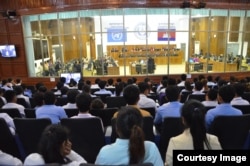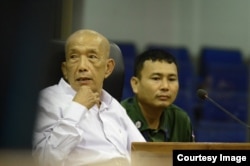Editor’s Note: Alex Hinton is the director of the Center for the Study of Genocide and Human Rights and a professor of anthropology at Rutgers University. He has served as the president of the International Association of Genocide Scholars and the UNESCO Chair in Genocide Prevention. Hinton is a prolific author and Cambodia expert and has served as a witness at the Khmer Rouge Tribunal. He spoke to VOA’s Chetra Chap about his latest book project, The Justice Façade.
You wrote a book about the Khmer Rouge Tribunal called “The Justice Façade.” What is meant by that?
In terms of specifically what the title means, it meant if you look at a facade, it’s an exterior and the book argues that the idea that somehow, they often frame it, the international community can deliver justice to Cambodians. It's like a facade that obscures all the complex history that lies behind the tribunal as well as sets of meaning that people have in the way which they interpret what's going on. So, the book argues that it is necessary to step behind this facade and understand how everyday Cambodians and people understand what's going on in this juridical process. So, my original intention has been to try and talk to people and understand how Cambodians on the ground, including Cambodians living in the rural villages, understood this thing that is often called international justice, as often framed with the term “transitional justice” which is linked to a series of objectives such as delivering justice, peace, reconciliation as well as things like democratization. So, from the very beginning, even before I wrote “Man or Monster,” I had in mind the book that became “The Justice Facade”.
Are you arguing that Cambodians have a different interpretation of the concept of justice than the international community?
Yes, that's a very good question. So, the book looks a lot at the sets of the Buddhist understanding that mediates the experience of people who, for example, are testifying and what the tribunal means to them. So, to give you one quick example, in the court room, I would ask people, “Why did you testify? What did it mean to you?” People would often say “Well, you know, I want justice.” That's certainly true, but there's another set of belief that is secluded if you have just the word justice in English and this is often understood as Buddhist terms in Cambodia. For example, some civil parties I spoke to said that it wasn't just that they wanted justice but they wanted justice returned for the spirits of the dead, and they actually viewed their act of giving testimony both for themselves but also for their lost loved ones, and also to help, for example, with their rebirth. Different civil parties, for example, said that the spirit of the dead was actually circulating in the courtroom. There was even one person who held up a picture of his brother who had been killed in S21, Toul Sleng, and said, “Brother, you're here with me in this court room. I am doing this for you,” while he was holding up his picture. So, those sets of understandings are about what, on the very superficial level, is called justice. What this means on the local level is much more complex and often diverges strongly from those in international justice or international transitional justice.
Can you clarify again the concept of justice from the Buddhist perspective? How is it different from the international context?
Sure. That's a good question. So, one way to think about it. Again, neither of these is a completely singular thing but through a notion of karma, for example. That action in the past conditions what comes in the future. So, this means if you talk to some Cambodians, for example, some people I spoke with, when asked if there was a need for a tribunal, some people said no. In fact, the people who had done bad deeds, like Khmer Rouge leaders, would be punished in their future lives. Another way people sometimes spoke about it was in terms of responsibility, that, in fact, what had happened to even the victims was also something that was linked to past acts. I spoke to a survivor of S21 who said, “You know, in the past, I must have done things and been tied in malice with Duch, the head of S21. And that influenced the situation that we had, that took place under the Khmer Rouge. Again, in terms of rebirth, for example, and the transferring the merit to the dead to help out with rebirth. The notion of going to the court, it was done so that merit can be transferred to the spirits of the dead so that it would improve if they were suspended between realms, it would improve their chances to be reborn and to be reborn in a better place.
So the people believe that the court actually gives good deeds to the dead spirits?
Absolutely. It’s like a giant Bangsokol. Again, you can't generalize with everyone but effectively that's what some people have viewed it as, so there are multiple things the court does, but one of them is like a giant ritual Bangsokol ceremony, where merit’s being transferred to the dead. So, many people talk to me about this sort of transfer. Also, a lot of the book details efforts of Cambodian non-governmental organizations as well as the court itself to try and translate this thing that is called global justice into terms that people would understand. I talked about these stories in the book. Some of the people I spoke with who are engaged in these activities, were very aware that this was a way that they could get people to understand and engage with the tribunal and people very directly. Some people I spoke with would make this analogy with the court and transferring merit to the spirits of the dead.
How did the Cambodian people feel about global justice and do they think that their Buddhist version of justice has been served by the court?
You know, that’s a complicated question, one I would never myself want to answer since this is what it means to Cambodians so they can best speak for themselves. Who are we talking about? If we are talking about the mid-level former Khmer Rouge living in Anglong Veng or Pailin or some other areas like that, many of them say they don’t think there is any need at all for the tribunal. Not everyone, but a number of people say that. There are other people who are older, grandmothers, for example, Yeay Chi who were at the Wat. If you asked them, for example, some of them might say there's no need for the tribunal because these people will be reborn. We need to let go of our attachment. Karma will deliver justice to them. There are other people who very much want justice, some sort of accountability for things that had happened in the past. Those sort of understandings begin to converge with notions of international justice. But almost everyone I spoke with, in some sense discussed the spirit of the dead. Reach Sambath, the former head of the public affairs section who was an incredible person and devised a program with his colleagues to bring Cambodians from all over the country to the court. He himself told me once that his nickname was “Spokesperson for the Ghost of the Dead.” He himself had lost family members and very much viewed his participation in some sense linked to the death of the spirits of his family members who were still with him. Their spirits still circulated. So again, the official spokesperson for the court viewed the tribunal in this manner as well as understanding western concepts of international justice. He saw both dimensions for the court.
Personally, how would you rate the performance of the Khmer Rouge Tribunal?
Again, I am hesitant to pass judgment because there are so many different opinions, so I would not want to represent other people from the outside by just looking at the accomplishment of the tribunal. There have been basically two trials that have gone forth and have rendered a verdict or judgment that has been upheld. We are in the third trial case 2.2 which includes the important charge of genocide, and I actually testify as an expert witness in case 2.2. That one is near a conclusion and a verdict is expected sometime this year. I have learned from the very start, when I started my project, I was an expert in legal anthropology. I learned a great deal. One of my first lessons was justice moves slowly and that's certainly been the case in this tribunal. There's no doubt that there are a number of shortcomings in terms of the politicization of the tribunal, in terms of corruption allegations that have gone on, and in terms of critics of the court for not moving forward beyond the initial five suspects. People tend to say, though there is no official confirmation that the tribunal likely will shut down after case 2.2. In those senses, I think those are shortcomings of the court but it also has accomplishments.
Why do you think that they did not continue with proceedings?
The reason that is given is because there is no political will that Prime Minister Hun Sen himself has said on a number of occasions that this will be it, will be the initial five. There's a public divergence between what numbers of the international community who negotiated the agreement said and what Sok An and Hun Sen and others involved in the negotiation on the Cambodian side said. So, on the Cambodian side, they say that the intention always was just to try a very small number of people and five was enough. It's necessary for Cambodia to move on in the name of peace and reconciliation and security. On the international side, there are claims that that number was never the number that was envisioned and in fact as many as a dozen, maybe 18 or more people would be tried. So, again, there are two different opinions about this and then the Cambodian government doesn't want the tribunal’s sustained operation as it doesn't want more cases. That's not going to happen. So, that seems to be where we are where it seems very unlikely that the tribunal will continue.
Is there anything else you would like to add?
I might just add one small thing about what may ultimately be the good that the court does is that it creates a sense of possibility for people. This is where I end. If we move away from the justice facade ideal that somehow everything miraculously will be transformed through the tribunal and have more modest goals, you can look at the tribunal as creating a set of possibilities and it may have different sorts of meanings for different people. For some, it may be about achieving justice for the spirits of the dead, transferring merit to the dead so that they can be reborn in a better place. For others, it may just be something that contributes to their imagination, their understanding of the possibilities that exist for how things might be otherwise. So again, that's something that people often talk about in terms of the tribunal, but I think it’s something that is important to take notice about, but you can't notice that until you step behind the justice facade.
Note: this interview was edited for length and clarity.
Transcribed by Bun Penghuy
















